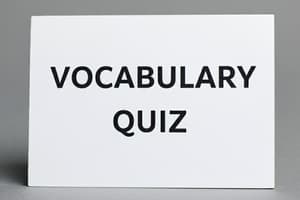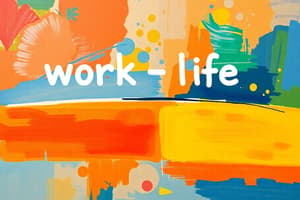Podcast
Questions and Answers
What is typically considered a stressor?
What is typically considered a stressor?
- Daily routine tasks
- Things that cause stress from various situations (correct)
- Positive experiences and achievements
- Leisure activities
Which characteristic best describes a Type A personality?
Which characteristic best describes a Type A personality?
- Relaxed approach to tasks
- Less competitive than others
- Strong sense of time urgency (correct)
- Ability to work at a constant pace
Stress is best defined as which of the following?
Stress is best defined as which of the following?
- An individual's response to excessive personal demands (correct)
- A temporary feeling of sadness and anxiety
- A feeling that only occurs in high-pressure jobs
- A relaxed state caused by manageable challenges
What is a common misconception about Type A personalities?
What is a common misconception about Type A personalities?
Which statement about stress perception is true?
Which statement about stress perception is true?
How do Type B personalities generally approach their work compared to Type A personalities?
How do Type B personalities generally approach their work compared to Type A personalities?
Which situation is most likely to contribute to stress?
Which situation is most likely to contribute to stress?
How might stress influence an individual’s performance?
How might stress influence an individual’s performance?
Which of the following statements about Type A and Type B personalities is true?
Which of the following statements about Type A and Type B personalities is true?
Why might Type A individuals not always be more successful than Type B individuals?
Why might Type A individuals not always be more successful than Type B individuals?
What emotional state is characterized by a feeling of distance from others?
What emotional state is characterized by a feeling of distance from others?
What effect does increased task demands have on behavior?
What effect does increased task demands have on behavior?
Which individual coping strategy primarily focuses on managing one's time effectively?
Which individual coping strategy primarily focuses on managing one's time effectively?
What is diminished personal accomplishment most accurately described as?
What is diminished personal accomplishment most accurately described as?
Which of the following is a potential organizational consequence of stress?
Which of the following is a potential organizational consequence of stress?
In what way can role management help alleviate stress?
In what way can role management help alleviate stress?
Which type of stressor is associated with interpersonal demands?
Which type of stressor is associated with interpersonal demands?
Which of the following factors can contribute to psychological consequences of stress?
Which of the following factors can contribute to psychological consequences of stress?
What is the primary focus of individual consequences of stress?
What is the primary focus of individual consequences of stress?
Which of the following is considered a behavioral consequence of stress?
Which of the following is considered a behavioral consequence of stress?
What organizational consequence results from too much stress affecting overall productivity?
What organizational consequence results from too much stress affecting overall productivity?
Which aspect of burnout relates to feeling drained by excessive demands?
Which aspect of burnout relates to feeling drained by excessive demands?
The two significant forms of withdrawal due to stress in an organization are characterized by which behaviors?
The two significant forms of withdrawal due to stress in an organization are characterized by which behaviors?
How do psychological consequences of stress affect an individual?
How do psychological consequences of stress affect an individual?
What is a common outcome of decreased attitudes within an organization due to stress?
What is a common outcome of decreased attitudes within an organization due to stress?
What is a characteristic feature of the medical consequences of stress?
What is a characteristic feature of the medical consequences of stress?
Which of the following is NOT a consequence of organizational stressors?
Which of the following is NOT a consequence of organizational stressors?
Which type of stressor is related to uncertainty in job responsibilities?
Which type of stressor is related to uncertainty in job responsibilities?
What are life stressors primarily associated with?
What are life stressors primarily associated with?
Which consequence of stress is considered constructive?
Which consequence of stress is considered constructive?
What type of stress involves physically demanding jobs?
What type of stress involves physically demanding jobs?
Which individual consequence is associated with destructive stress?
Which individual consequence is associated with destructive stress?
Which life stressor category is related to transitions such as marriage or relocation?
Which life stressor category is related to transitions such as marriage or relocation?
What can be a potential effect of chronic stress over time?
What can be a potential effect of chronic stress over time?
Flashcards
What is stress?
What is stress?
Stress is a natural response to challenging situations that demand a lot from us physically or mentally.
What are stressors?
What are stressors?
Stressors are the things that cause us to feel stressed.
Where do stressors come from?
Where do stressors come from?
Stressors can come from various sources, including work, personal life, and other situations.
Why does stress affect everyone differently?
Why does stress affect everyone differently?
Signup and view all the flashcards
How can stress affect us?
How can stress affect us?
Signup and view all the flashcards
Type A Personality
Type A Personality
Signup and view all the flashcards
Type B Personality
Type B Personality
Signup and view all the flashcards
Type A Success Myth
Type A Success Myth
Signup and view all the flashcards
Type A and Type B Spectrum
Type A and Type B Spectrum
Signup and view all the flashcards
Type B Interpersonal Skills
Type B Interpersonal Skills
Signup and view all the flashcards
Organizational Stressors
Organizational Stressors
Signup and view all the flashcards
Life Stressors
Life Stressors
Signup and view all the flashcards
Constructive Stress
Constructive Stress
Signup and view all the flashcards
Destructive Stress
Destructive Stress
Signup and view all the flashcards
Individual Consequences of Stress
Individual Consequences of Stress
Signup and view all the flashcards
Organizational Consequences of Stress
Organizational Consequences of Stress
Signup and view all the flashcards
Burnout
Burnout
Signup and view all the flashcards
Task Demands
Task Demands
Signup and view all the flashcards
Behavioral Consequences of Stress
Behavioral Consequences of Stress
Signup and view all the flashcards
Psychological Consequences of Stress
Psychological Consequences of Stress
Signup and view all the flashcards
Medical Consequences of Stress
Medical Consequences of Stress
Signup and view all the flashcards
Performance
Performance
Signup and view all the flashcards
Withdrawal
Withdrawal
Signup and view all the flashcards
Attitudes
Attitudes
Signup and view all the flashcards
Depersonalization
Depersonalization
Signup and view all the flashcards
Diminished Personal Accomplishment
Diminished Personal Accomplishment
Signup and view all the flashcards
Physical Demands
Physical Demands
Signup and view all the flashcards
Role Demands
Role Demands
Signup and view all the flashcards
Interpersonal Demands
Interpersonal Demands
Signup and view all the flashcards
Exercise
Exercise
Signup and view all the flashcards
Study Notes
Managing Stress and Work-Life Balance
- Stress is caused by a stimulus, which can be physical or psychological.
- An individual's response to the stimulus is their adaptive response to this stressor
- One person's stressor may be another's non-stressful experience
- Stress will only occur if the stimulus or demand is perceived as excessive by the individual
Success Criteria
- Evaluate the impact of personal stress on performance
- Describe factors that contribute to stress.
- Analyze techniques to reduce stress.
Part One - Causes of Stress
- None
Stress Defined
- Stress is a state of tension experienced by individuals when facing extraordinary demands, constraints, or opportunities.
- Stressors originate in work, personal, and non-work situations
- Stressors have the potential to influence work attitudes, behaviour, job performance, and health
Individual Differences and Stress
- Type A personalities are very competitive, devoted to work, and have a strong sense of time urgency. They are likely to be aggressive, impatient, and highly work-oriented
- Type B personalities are less competitive, devoted to work, and have a weaker sense of time urgency. They feel less conflict with people or time, and have a more balanced and relaxed approach to life.
- They can work at a constant pace
Four Corners Activity
- Students are to place themselves into one of four corners to indicate their Type A or Type B nature.
- The corners represent definitely Type A, slightly Type A, slightly Type B, and definitely Type B.
Part Two - Consequences of Stress
- Stress can be positive (constructive) or negative (destructive).
- Stress can enhance positive attributes like energy and motivation, but it can be destructive to a person's physical and mental systems.
- Negative stress can lead to job burnout and workplace rage.
Organizational Stressors
- Task demands (type of occupation, security, overload)
- Physical demands (temperature, strenuous labour, office design)
- Role demands (ambiguity, conflict, role overload)
- Interpersonal demands (group pressures, leadership style, interpersonal conflict.
- Life stressors (life change, life trauma).
Consequences of Organizational Stress
- Decline in performance
- Withdrawal
- Negative attitudes
- Burnout
Consequences of Stress on Individuals
- Behavioural consequences (alcohol/drug abuse, violence, eating disorders)
- Psychological consequences (depression, sleep disorders, family problems)
- Medical consequences (heart disease, stroke, headaches, backaches, ulcers)
Burnout
- Exhaustion
- Depersonalization
- Diminished personal accomplishment
Part Three - Solutions to Stress
Individual Coping Strategies
- Exercise
- Relaxation
- Time management (daily lists, prioritization)
- Role management (avoiding overload, asking for clarification, learning to say no.)
- Support groups
Organizational Coping Strategies
- Organizations recognizing their role in employee stress and taking responsibility for relieving the stress
- Creating a supportive environment for workers with less harmful stress to thrive
Personal Wellness
- Pursuit of personal and mental potential
- A form of preventive stress management (stopping stress before it happens)
- Preparing individuals better to deal with stress
Studying That Suits You
Use AI to generate personalized quizzes and flashcards to suit your learning preferences.





